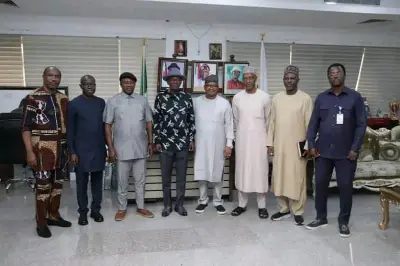August 22, 2025 – The Governor of Bayelsa State, Senator Douye Diri, has urged medical institutions in Nigeria to adopt modern trends in medical science such as biomedical engineering and emergency medicine to address the rising issue of brain drain in the health sector.
Governor Diri made the call on Thursday when the Ministerial Monitoring Committee of the Tertiary Education Trust Fund (TETFUND) High Impact Intervention in Medical Sciences paid a visit to Government House, Yenagoa.
Represented by his deputy, Senator Lawrence Ewhrudjakpo, the governor described the country’s current medical practice as largely traditional. He stressed that with the right political will and collective commitment from stakeholders, Nigeria could achieve significant progress in healthcare delivery.
He noted that introducing biomedical engineering and emergency medicine into the country’s health institutions, alongside improving medical infrastructure, would help reduce the number of qualified professionals leaving Nigeria for opportunities abroad.
Underscoring the importance of both health and education, Governor Diri stated that his administration would continue to inject resources into the two sectors in order to improve the living standards of Bayelsa citizens. He also expressed gratitude to the Federal Ministry of Education and the Executive Secretary of TETFUND for supporting projects at the Bayelsa Medical University (BMU).
“We are quite excited and we extend our appreciation and gratitude to the Minister of Education, and the Executive Secretary of the TETFUND for looking towards our direction. We have been looking for partnerships such as this to enable us do better,” he said.
“We are happy you are focused on an area we have a challenge. And I think that challenge is both self-imposed and exacerbated by greed in our country. But we are happy with what you are doing to retain health manpower in the country.
“Again, I think we should start looking at modern trends in medicine. In my opinion, we are still very traditional in our medical practice. There are new areas in medicine like biomedical engineering, which is an area we really need to look at.
“Because if we have CT Scan, MRI and the rest of them, yet we don’t have the biomedical engineers needed to fix these equipment, we will not achieve the desired progress in our health sector.
“Then we also have emergency medicine. If we inject these two areas into our current practice, it will give us the latitude to take care of a lot of people who would be swallowed up by the offering we will be giving,” the governor said.
Speaking earlier, the leader of the TETFUND Ministerial Monitoring team, Professor Saad Ahmed, explained that the special high-impact project for revitalization of medical schools was initiated by the Federal Government to address the increasing emigration of health workers from Nigeria.
Professor Ahmed, who is the Chief Medical Director of the Federal Medical Centre, Abuja, said one of the strategies to combat brain drain was to expand the training and production of healthcare professionals. According to him, funds had already been allocated to 18 medical schools across the country to strengthen manpower development.
He added that the funds would be used to provide infrastructure and medical equipment, with a focus on medicine, dentistry, nursing sciences, and pharmacy. He also revealed that a separate allocation would soon be provided to improve hostel accommodation in the medical schools.
The TETFUND delegation also included the Director of the Physical Infrastructure Department, Mr. Y.M. Ashuru, and the Deputy Director, Dr. Yusuf Gamawa. They were joined by top management staff of the Bayelsa Medical University, led by the Vice Chancellor, Professor Dimie Ogoina.

